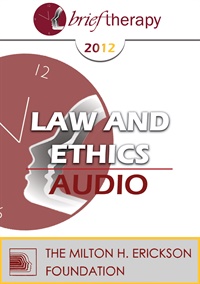
- Average Rating:
- Not yet rated
- Topic Areas:
- Master Classes | Brief Therapy | Experiential Therapy | Gestalt | Hypnosis | Ericksonian Hypnosis and Therapy Techniques | Hypnotherapy | Psychotherapy
- Categories:
- Brief Therapy Conference | Brief Therapy Conference 2012
- Faculty:
- Jeffrey Zeig, PhD | Erving Polster, PhD
- Duration:
- 2:40:44
- Format:
- Audio Only
- Original Program Date:
- Dec 10, 2012
- Short Description:
- Gestalt therapy and Ericksonian hypnotherapy are experiential methods of change. In combination they can be synergistic. Psychotherapy is best when clients have first-hand experience of an alive therapeutic process. Such dynamic empowering experiences pave the way for dynamic understandings. Drs. Polster and Zeig will engage with each other and participants to examine commonalities and differences in their work in this engaging all-day workshop.
- Price:
- $15.00 - Base Price
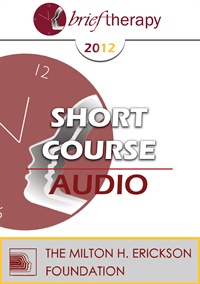
- Average Rating:
- Not yet rated
- Topic Areas:
- Psychotherapy | Short Courses
- Categories:
- Brief Therapy Conference | Brief Therapy Conference 2012
- Faculty:
- Daniel Bass
- Duration:
- 1:30:16
- Format:
- Audio Only
- Original Program Date:
- Dec 05, 2012
- Short Description:
- BT12 Short Course 04 – Using Movies in Ericksonian Therapy – Daniel Bass, Dipl. Psych Movies are complex multisensory stories reflecting a specific world. They transport messages and solutions in order to provide the viewer with the possibility of identifying with the movie characters, get absorbed in it, empathize, recognize consciously or subconsciously one’s own central topics in life. They provide the possibility of being catalysts for developmental processes that can be used in psychotherapy. In this presentation participants will learn about the processes of watching movies and the transfer into therapy.
- Price:
- $15.00 - Base Price
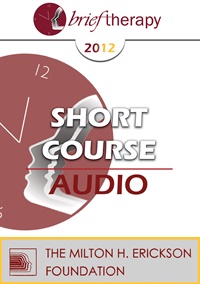
- Average Rating:
- Not yet rated
- Topic Areas:
- Psychotherapy | Meditation, Spirituality and Yoga | Short Courses
- Categories:
- Brief Therapy Conference | Brief Therapy Conference 2012
- Faculty:
- Assen Alladin, PhD
- Duration:
- 1:35:13
- Format:
- Audio Only
- Original Program Date:
- Dec 05, 2012
- Short Description:
- BT12 Short Course 07 – Blending Science, Spirituality and Beliefs to Enhance the Effect of Psychotherapy – Assen Alladin, PhD Mindfulness-based psychotherapy provides an evidence-based model for integrating diverse cultural beliefs and wisdoms in therapy. This course will demonstrate how to integrate cultural beliefs and wisdoms in short-term psychotherapies. Non Western societies attach more importance to the heart. The heart is considered central to producing changes in psychotherapy because a person validates reality not by how they think (cognition) but how the person feels (affect). Moreover, societal pressure and the focus on individualism unintentionally create “neurosis” and a tendency towards “narcissism” in our culture.
- Price:
- $15.00 - Base Price
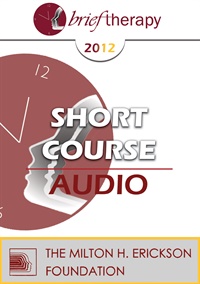
- Average Rating:
- Not yet rated
- Topic Areas:
- Psychotherapy | Anxiety | Depression | Short Courses
- Categories:
- Brief Therapy Conference | Brief Therapy Conference 2012
- Faculty:
- Virgil Hayes, DO
- Duration:
- 1:24:45
- Format:
- Audio Only
- Original Program Date:
- Dec 05, 2012
- Short Description:
- BT12 Short Course 25 – How to Thoroughly Co-Create Brief Therapy Efficiently and Effectively – Virgil Hayes, DO, MSW Psychotherapy is a blend of art and science. However, the art of using a conceptual framework to co-create solutions is overlooked in favor of medical paradigms. This short course focuses on non-medical understandings of anxiety and depression creation to enable the clinician to be more effective in co-creating solutions. Case discussion and lecture for all skill levels.
- Price:
- $15.00 - Base Price
Tags: Psychotherapy Anxiety Depression
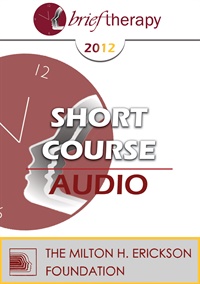
- Average Rating:
- Not yet rated
- Topic Areas:
- Psychotherapy | Short Courses | Humor
- Categories:
- Brief Therapy Conference | Brief Therapy Conference 2012
- Faculty:
- Steve Sultanoff
- Duration:
- 1:26:57
- Format:
- Audio Only
- Original Program Date:
- Dec 05, 2012
- Short Description:
- BT12 Short Course 28 – Humor Matters: Clinical Application of Humor in Psychotherapy – Steve Sultanoff, PhD Humor in the serious realm of psychotherapy? In this lively presentation, filled with anecdotes and clinical illustrations, we will explore the rationale for and practical application of the conscious and purposeful use of humor in psychotherapy. Humor can create change in the central aspects of human experience—cognitions, emotions, behaviors, and physiology. We will explore how humor can be a powerful tool to build the relationship, diagnose, and treat, and we will differentiate between empathic and hostile styles of humor.
- Price:
- $15.00 - Base Price
Tags: Humor Psychotherapy
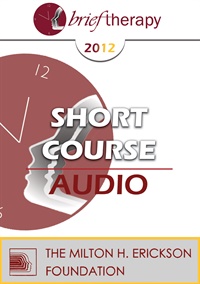
- Average Rating:
- Not yet rated
- Topic Areas:
- Animal Assisted Therapy | Psychotherapy | Short Courses | Metaphors | Brief Therapy
- Categories:
- Brief Therapy Conference | Brief Therapy Conference 2012
- Faculty:
- Dale Klein-Kennedy, LPCC | Karen Wall
- Duration:
- 1:07:50
- Format:
- Audio Only
- Original Program Date:
- Dec 09, 2012
- Short Description:
- Animal metaphors are used as a part of our everyday vocabulary describing relationships, personal characteristics, etc. Metaphor in the presence of the work with the animal takes on a new and deeper meaning. This presentation will demonstrate the powerful use of animals and animal metaphors in brief psychotherapy. Through examples and discussion of the work, attendees will develop an understanding of ATT (animal-assisted therapy) and will participate in a live demonstration of AAT.
- Price:
- $15.00 - Base Price
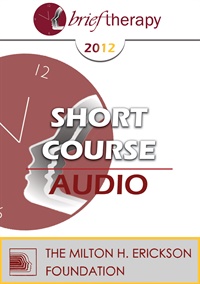
- Average Rating:
- Not yet rated
- Topic Areas:
- Psychotherapy | Children and Adolescent Therapy | Short Courses
- Categories:
- Brief Therapy Conference | Brief Therapy Conference 2012
- Faculty:
- Maria Escalante de Smith, MA
- Duration:
- 1:14:40
- Format:
- Audio Only
- Original Program Date:
- Dec 09, 2012
- Short Description:
- BT12 Short Course 40 – Brief Psychotherapy for Children and Adolescents Facing Serious Situations – Maria Escalante de Smith, MA When children and teenagers face serious problems they experience a variety of feelings and emotions. Brief Therapy techniques can help them find solutions and explore new alternatives within a short time. Short interventions, such as brief trances and conversational hypnosis will be demonstrated. Utilization of individual’s resources, likes, and favorite activities will also be discussed as brief therapy tools will be used during therapy. Participants will be able to explore how other approaches such as Narrative Therapy can enhance and embellish Ericksonian approaches.
- Price:
- $15.00 - Base Price
Tags: Children Psychotherapy Adolescents
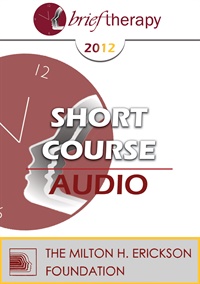
- Average Rating:
- Not yet rated
- Topic Areas:
- Trance | Neuroscience | Psychotherapy | Short Courses
- Categories:
- Brief Therapy Conference | Brief Therapy Conference 2012
- Faculty:
- Susan Pinco, PhD
- Duration:
- 1:13:42
- Format:
- Audio Only
- Original Program Date:
- Dec 09, 2012
- Short Description:
- BT12 Short Course 47 – Is it the Talking that Cures? An Exploration of the Role of Silence and Words in the Clinical Encounter – Susan Pinco, PhD Explore the role that silence plays in the hypnotic and clinical process. Our journey will begin with a discussion of structured and unstructured silence, how both are manifested, and potentially utilized. It continues with an overview of research related to silence in psychotherapy as well as findings in neuroscience that help explain why silence is a key ingredient in effective trance-formational processes. Attendees will engage in exercises that are designed to expand their awareness of the pivotal role that silence plays in healing and in so doing facilitate the conscious development of strategic interventions that utilize silence hypnotically to address a wide range of clinical issues.
- Price:
- $15.00 - Base Price
Tags: Neuroscience Psychotherapy Trance
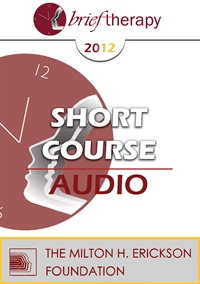
- Average Rating:
- Not yet rated
- Topic Areas:
- Psychotherapy | Short Courses
- Categories:
- Brief Therapy Conference | Brief Therapy Conference 2012
- Faculty:
- Roxanna Erickson Klein, RN, PhD, LPC, LCDC | Pennie Johnson
- Duration:
- 1:42:53
- Format:
- Audio Only
- Original Program Date:
- Dec 09, 2012
- Short Description:
- BT12 Short Course 49 – Milton Erickson and Patrick Carnes: Comparing and Contrasting the Work of Two Leaders – Roxanna Erickson-Klein, PhD, and Pennie Johnson, MA This course will look at the work of two charismatic leaders, each of who made a substantial impact to psychotherapy practiced today. Commonalities and differences will be explored, and the relevance of their work will be discussed. Ideology, strategies, and principles of treatment will be compared and contrasted.
- Price:
- $15.00 - Base Price
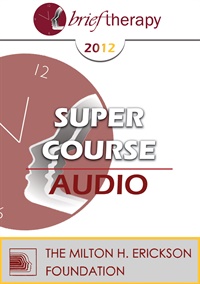
- Average Rating:
- Not yet rated
- Topic Areas:
- Psychotherapy | Super Courses | Tailoring | Mindfulness
- Categories:
- Brief Therapy Conference | Brief Therapy Conference 2012
- Faculty:
- Ronald Siegel, PsyD
- Duration:
- 4:40:35
- Format:
- Audio Only
- Original Program Date:
- Dec 09, 2012
- Short Description:
- BT12 Super Course 03 – Harnessing Mindfulness: Tailoring the Practice to the Problem – Ronald Siegel, PsyD Mindfulness-based psychotherapy is the most popular new treatment approach in the last decade—and for good reason. Mindfulness practices hold great promise both for our own personal development and as remarkably powerful tools to augment virtually every form of psychotherapy. Mindfulness is not, however, a one-size-fits-all remedy. In this workshop you’ll learn how mindfulness practices work to alleviate psychological distress, and how to creatively tailor them to meet the needs of diverse people and conditions. We’ll examine how to use mindfulness practices to help resolve disorders such as anxiety, depression, and stress-related medical problems, while enriching and enlivening therapeutic work.
- Price:
- $15.00 - Base Price
Tags: Mindfulness
Please wait ...

